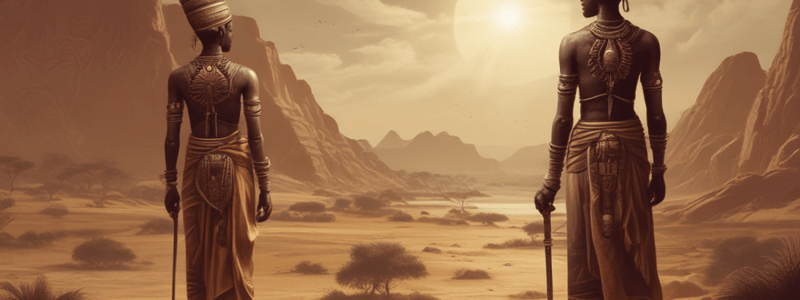Podcast
Questions and Answers
What was the primary function of the pyramids built in Ancient Egypt?
What was the primary function of the pyramids built in Ancient Egypt?
- Temples for worship
- Graves for pharaohs (correct)
- Civic centers for gathering
- Fortresses for defense
What characterized the Axum Empire's trade connections?
What characterized the Axum Empire's trade connections?
- Focused only on trade within Africa
- Connections to India and the Mediterranean (correct)
- Exclusively with Europe
- Isolated from other regions
Which empire controlled trans-Saharan trade before the Mali Empire?
Which empire controlled trans-Saharan trade before the Mali Empire?
- Ghana Empire (correct)
- Nubian Kingdom
- Axum Empire
- Songhai Empire
What was an outcome of the Scramble for Africa?
What was an outcome of the Scramble for Africa?
Which notable city was a center of trade and learning during the Mali Empire?
Which notable city was a center of trade and learning during the Mali Empire?
What influenced the architecture of the Swahili City-States?
What influenced the architecture of the Swahili City-States?
Who was a prominent leader involved in African nationalist movements?
Who was a prominent leader involved in African nationalist movements?
What has been a significant challenge for post-colonial African states?
What has been a significant challenge for post-colonial African states?
Flashcards are hidden until you start studying
Study Notes
Ancient Africa
- Ancient Egypt (3100 BCE - 30 BCE):
- Pyramids of Giza, Luxor, and Abu Simbel
- Pharaonic dynasties (Old, Middle, New Kingdoms)
- Hieroglyphics, mummification, and afterlife beliefs
- Nubia (2000 BCE - 300 CE):
- Located in modern-day Sudan
- Kingdom of Kush, with pyramids at Meroe
- Interaction with ancient Egypt
- Axum Empire (1st century CE - 700 CE):
- Located in modern-day Ethiopia and Eritrea
- Powerful trading empire, with connections to India and Mediterranean
- Introduction of Christianity
Medieval Africa
- Swahili City-States (8th century - 15th century):
- Coastal trade centers in modern-day Tanzania, Kenya, and Mozambique
- Islamic influence, architecture, and trade networks
- Ghana Empire (300 CE - 1200 CE):
- Located in modern-day Mali and Senegal
- Powerful empire, with control of trans-Saharan trade
- Introduction of Islam
- Mali Empire (1200 CE - 1500 CE):
- Located in modern-day Mali, Senegal, and Guinea
- Empire of Sundiata Keita, with expansion and Islamic influence
- Famous for Timbuktu, a center of trade and learning
Colonial and Modern Africa
- Scramble for Africa (1881-1914):
- European colonization of Africa, with Berlin Conference (1884-85)
- Division of Africa into colonies, with exploitation of resources
- Nationalist Movements (mid-20th century):
- Independence struggles, with leaders like Kwame Nkrumah and Julius Nyerere
- Decolonization, with formation of modern African states
- Post-Colonial Africa (mid-20th century - present):
- Challenges of economic development, political instability, and conflict
- Ongoing struggles for democracy, human rights, and economic growth
Ancient Africa
-
Ancient Egypt (3100 BCE - 30 BCE) notable for monumental architecture including the Pyramids of Giza, Luxor Temple, and Abu Simbel.
-
Egyptian civilization characterized by three major phases: Old, Middle, and New Kingdoms, each with distinct cultural achievements.
-
Hieroglyphics served as a sophisticated writing system; mummification practices reflected beliefs in an afterlife.
-
Nubia (2000 BCE - 300 CE) situated in present-day Sudan, was home to the Kingdom of Kush, known for its pyramids at Meroe.
-
Nubians interacted culturally and militarily with ancient Egypt, influencing and being influenced by Egyptian practices and beliefs.
-
Axum Empire (1st century CE - 700 CE) emerged in modern-day Ethiopia and Eritrea, recognized as a powerful trading hub linking Africa to India and the Mediterranean.
-
Notable for being an early adopter of Christianity, which significantly shaped its cultural identity.
Medieval Africa
-
Swahili City-States (8th century - 15th century) emerged as coastal trade centers in areas now known as Tanzania, Kenya, and Mozambique, thriving on trade routes across the Indian Ocean.
-
Strong Islamic influence evident in architecture, culture, and the establishment of extensive trade networks.
-
Ghana Empire (300 CE - 1200 CE) located in modern Mali and Senegal, facilitated trans-Saharan trade and became a center for gold trade.
-
Played a significant role in the spread of Islam in West Africa, which influenced local cultures and governance.
-
Mali Empire (1200 CE - 1500 CE), notable for leaders such as Sundiata Keita, expanded its territory and Islamic culture, influencing trade and education.
-
Timbuktu emerged as a prominent center of trade, culture, and Islamic scholarship during this period.
Colonial and Modern Africa
-
Scramble for Africa (1881-1914) marked intense European colonization, formalized during the Berlin Conference (1884-1885) which regulated colonization and trade.
-
Resulted in territorial divisions and exploitation of Africa's resources, significantly impacting local populations and cultures.
-
Nationalist Movements (mid-20th century) represented a wave of independence struggles against colonial rule, led by figures like Kwame Nkrumah in Ghana and Julius Nyerere in Tanzania.
-
The decolonization process reshaped the political landscape, leading to the emergence of independent African states.
-
Post-Colonial Africa (mid-20th century - present) faces significant challenges including economic development, political instability, and conflicts within and between nations.
-
Current struggles focus on establishing democracy, promoting human rights, and achieving sustained economic growth amidst ongoing social and political issues.
Studying That Suits You
Use AI to generate personalized quizzes and flashcards to suit your learning preferences.




